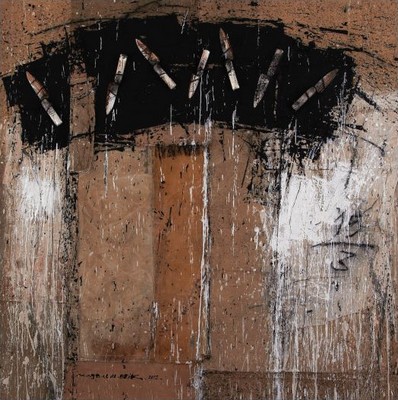Abdul Karim Majdal Al-Beik: Nota Bene
Ayyam Gallery, Dubai
Through 5 November 2021
Pain, 2012
Mixed Media on Canvas, 180 x 180 cm
© Abdul-Karim Majdal Al-Beik, Courtesy of Ayyam Gallery
Ayyam Gallery presents Nota Bene, a solo exhibition featuring works by ABDUL KARIM MAJDAL AL-BEIK.
‘The walls alone know our secrets,’ wrote Imad Mustafa, a poet and one of Al-Beik’s closest friends. This nota bene is just one of many composed by Al-Beik. “If walls are the canvases of madmen, then these madmen are my teachers,” he once wrote. Walls are people’s palimpsest and the daubed drops of paint, their ink. Through the plaster and paint, Al-Beik tells us society’s stories.
Al-Beik’s creativity reflects wisdom and sensibility beyond his years. The artist notices how each wall possesses a different character that, over time, changes shape, texture, and color thanks to the sun and the rain. Al-Beik and his work register time, climate, and environment, life’s inevitables. Al-Beik infuses each canvas with the essence of his surroundings, revealing in the individuality each piece offers. Careful to maintain authenticity in his expression, basic wall-building materials are Al-Beik’s tools. To reconstruct the passage of time, he applies several layers to each canvas.
Projecting himself into the future and stepping away from a cataloging approach. In this series, Abdul Karim wonders about the unfolding of the walls. Will they capture and absorb the violence and atrocities their owners witnessed? What layers will be added to portray and recreate the pain? Al-Beik shakes the need for authenticity to reality, now using these walls as a medium of expression.
Diving into his imagination and taking from the DADA movement, Al-Beik introduces objects in his compositions. Guns and knives are scattered across the canvases, surrounded by gestural strokes capturing the intensity of the depicted period. Survival and death are translated through the scarecrows and crosses. Adjacent to these symbols are stitching marks, seemingly keeping everything together, acting as signs of hope. The walls and canvases become symbolic abstractions of reality. Throughout the process, Al-Beik questions these objects and their presence, has war taken over our lives? Can it be that arms are now replacing adolescent love letters and graffiti?
KARIM MAJDAL AL-BEIK
In his large-scale mixed-media works, Abdul Karim Majdal Al-Beik transforms unconventional materials such as charcoal, plaster, starch, ash, and burlap into evocative mediums that reproduce the patina of imbued surfaces. Basing his ‘combine paintings’ on the weathered layers of graffiti, markings, and cracks that can be found on the exterior surfaces of public spaces, he seeks to explore how such understated facets can serve as records of the oscillation of society over time. Replicating the outer textures, colours, and shapes of deteriorating facades, Majdal Al-Beik excavates the buried traces of past lives, passages that situate cities as reluctant witnesses.
With the start of the war in Syria, Majdal Al-Beik’s practice has reflected greater usage of assemblage through the addition of found objects such as small crosses, fabric strips, string, guns, and knives in order to communicate the stark circumstances of life under conflict. His more recent works include a series of conceptual sculptures and installations alongside paintings and photographs as part of the larger series Postponed Democracy (2014). Madjal Al Beik now lives and works in Berlin, Germany.
Born in a small village on the outskirts of Al-Hasakah, Syria in 1973, Abdul Karim Majdal Al-Beik trained at the Faculty of Fine Arts, Damascus. His works are housed in public and private collections throughout the Middle East and Europe and he has been the recipient of several awards, including those from the Latakia Biennale and the Shabab Ayyam competition for emerging artists. Selected solo and group exhibitions include Fondazione Giorgio Cini, Venice (2015); Ayyam Gallery London (2014); Ayyam Gallery Al Quoz, Dubai (2014); Ayyam Gallery DIFC, Dubai (2015, 2014, 2013); Ayyam Projects, Beirut (2014); Ayyam Gallery Beirut (2014, 2012); Ayyam Gallery Damascus (2008); National Museum of Aleppo (2006); Tehran Biennale for Art in the Islamic World (2005); UNESCO Palace, Beirut (2001); and the British Council, Damascus (2000).
AYYAM GALLERY
B11, Alserkal Avenue, Street 8, Al Quoz 1, Dubai

